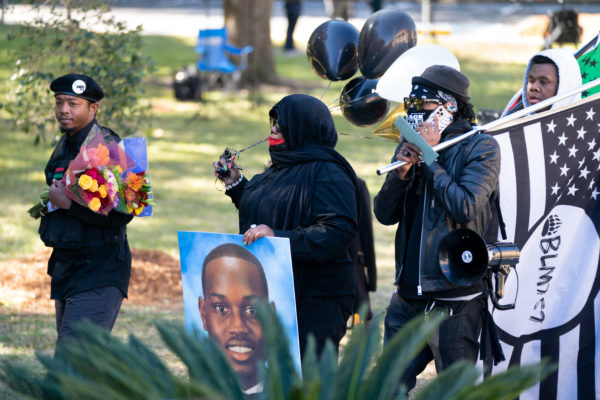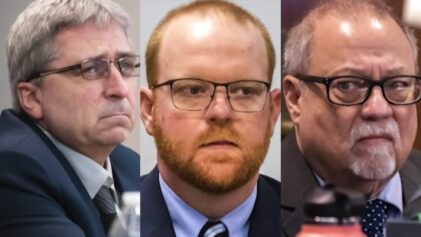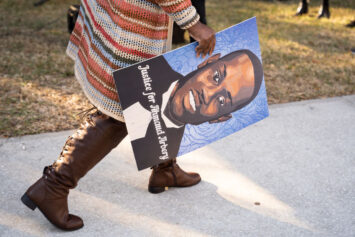The jury in the Ahmaud Arbery murder trial will continue deliberations Wednesday in a case entwined with racial tensions.
Three white men face nine charges for killing the 25-year-old Black man near Brunswick, Georgia. Arbery’s death led to a reform of the state’s archaic citizen’s arrest law, which was created in 1863 to punish Black Georgians.
Civil rights advocates said Arbery’s shooting death in broad daylight in a mostly white neighborhood was a modern-day lynching. A defense attorney for one of the men accused in the slaying said Black pastors and protestors attending the trial are the real mob in his client’s lynching. Legal experts said the defense attorneys are using racist dog whistles to initiate a hung jury in the case.

“I certainly don’t mean to suggest that Al Sharpton or Jesse Jackson or any other pastor belong to a mob, but at the same time, we are talking about organized behavior by whoever outside the courthouse leading up to this case,” Kevin Gough, who represents defendant William “Roddie” Bryan, told the trial judge as he raised a motion for a mistrial on Nov. 15.
That motion was denied, but by Friday, Nov. 19, Gough renewed the motion for mistrial, telling Glynn County Superior Court Judge Judge Timothy Walmsley, “This is what a public lynching looks like in the 21st century, with all due respect.”
The panel of 11 white jurors and one Black juror heard closing arguments from the state before six hours of deliberations Tuesday. Prosecuting attorney Linda Dunikoski said Arbery was jogging when he was cornered by Bryan and father-and-son duo Gregory and Travis McMichael.
Bryan joined the McMichaels’ pursuit of Arbery in his pickup truck and admitted to trapping the former athlete so that the other men could catch up with him. They believed he was responsible for a burglary in the neighborhood and attempted a citizen’s arrest, their attorneys said.
Dunikoski said they chased Arbery “because he was a Black man running down the street.” The younger of the two Michaels, Travis McMichael, said he shot and killed Arbery during a scuffle over his gun.
However, the accused men confirmed they had not seen Arbery commit a burglary or any crime when they followed him on Feb. 23, 2020. Arbery was unarmed, and the younger McMichaels said Arbery did not threaten or speak to him during the incident.
Before it was reformed, Georgia’s citizen arrest law allowed a person to detain someone if they saw the person commit a crime or reasonably suspected them of committing a crime. Gov. Brian Kemp and state legislators changed the law in response to Arbery’s slaying in May.
In his closing arguments, Travis McMichael’s attorney Jason Sheffield said his client was trying to “protect himself” when he aimed his shotgun at Arbery. However, Dunikoski argued that they could not claim self-defense when they were the ones pursuing the victim.
Dunikoski said Bryan played a “substantial and necessary part” in Arbery’s killing by blocking him with his truck. His attorney argued that Bryan, who recorded the incident, did not know that the McMichaels had weapons. Gough said the state would not have a case without Bryan’s video.
Gough has made several requests to the judge for a mistrial, and Monday, on the day of closing arguments, he again pressed the case to the judge to scrap the whole trial, claiming that the case is being influenced by Black pastors and a “mob” outside of the courthouse.
“Your honor, protesters, whether they were the Black Panther group or some other group, were behind the barriers in front of the courthouse,” Gough told the judge on Monday.
“There was a truck carrying a coffin with the names of the defendants on it,” Gough continued on Monday. “At least one of these groups, I believe it was the Black Panther group, is referenced in the motion filed this morning that their specific objective was to influence the proceedings in this case. Large weapons, apparently automatic weapons, were seen outside the courthouse.” Judge Walmsley again denied the mistrial motion.
Former federal prosecutor Charles Coleman told MSNBC’s Rachel Maddow that Gough repeatedly mentioned race to play on the implicit bias of the mostly white jury. One of Gregory McMichael’s lawyers, Laura Hogue, referred to Arbery’s “long, dirty toenails,” which legal experts also said likens him to a runaway slave.
“People have to understand, one of the first rules of being a trial attorney is understanding your audience,” Coleman told Maddow. “You have to know your audience. And at this point, what you have seen from the defense attorneys, not just Mr. Gough but also will [Gregory] McMichael’s defense attorney today, is the decision to put down the whispering and the dog whistle and pick up the bullhorn.”
Arbery’s mother, Wanda Cooper-Jones, left the courtroom on Monday after Hogue’s comments about her son’s appearance. Cooper-Jones told CNN she was disgusted with the comments, and the defense was trying to deflect attention from their weak case.
“I thought it was very, very rude to talk about his long, dirty toenails and to totally neglect that my son had a huge hole in his chest when he was shot with that shotgun,” she told CNN.
In her closing arguments on Tuesday, Dunikoski showed the jurors side-by-side photos of Arbery, one of him smiling and another of him lying dead in the street, The Atlanta Journal-Constitution reported.
“When you come back with your guilty verdict, all you’re doing is telling them, ‘We know what you did,'” Dunikoski said. “You turned this young man into that young man … for no good reason at all.”
News from our partners:

